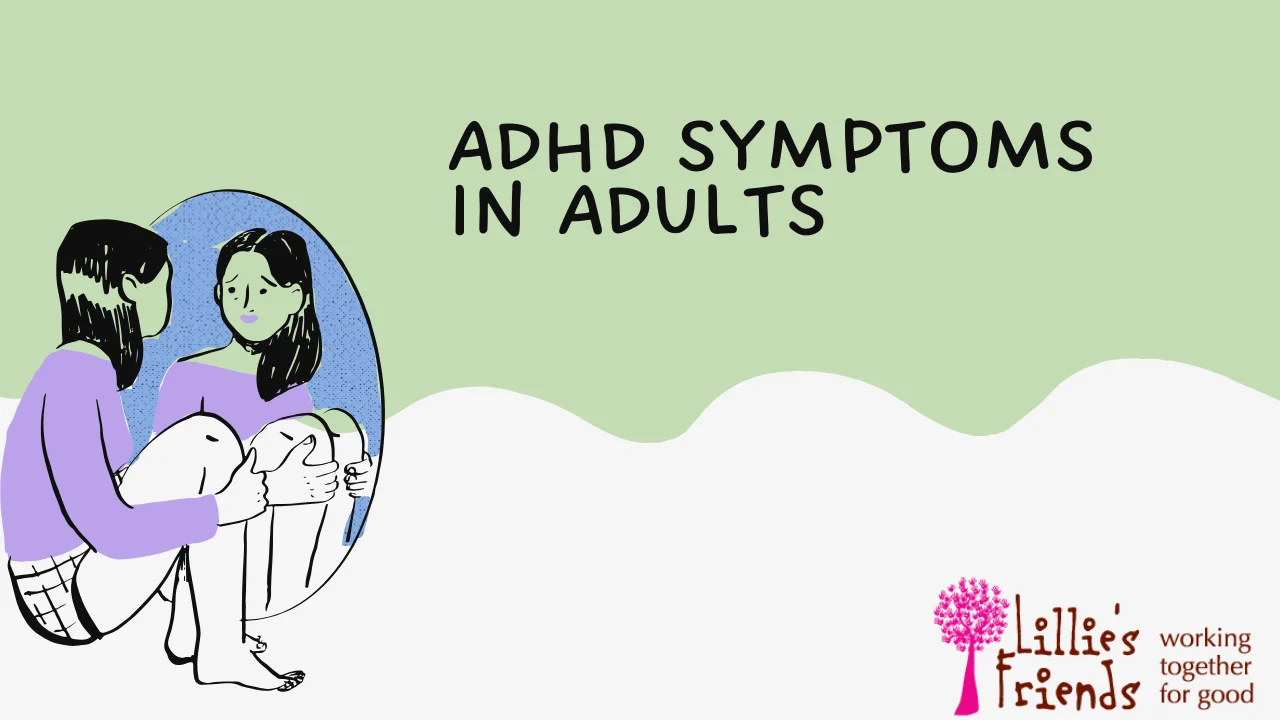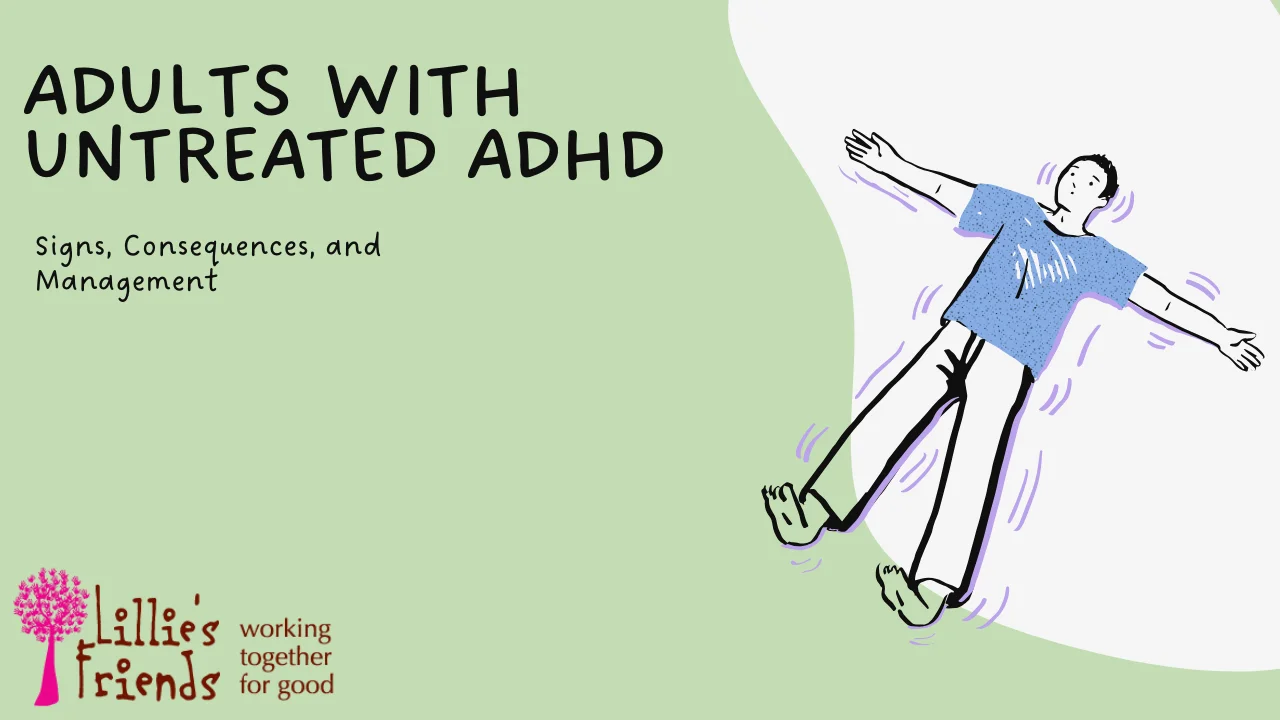Although attention deficit hyperactivity disorder (ADHD) is a childhood condition, if left untreated, it may persist into adulthood. People often underestimate how important it is to manage their symptoms even after receiving a diagnosis. Furthermore, individuals may not always be aware that the difficulties they face on a daily basis are a result of a mental health issue. So let’s study more about the main symptoms of ADHD in adults before discussing its long-term implications if left untreated.

ADHD symptoms in adults
ADHD is associated with two types of symptoms: hyperactivity and inattention. Adults are more likely to be inattentive since the symptoms of hyperactivity tend to fade with time [1*]. Additionally, people may exhibit symptoms from both groups, indicating a combined type of ADHD. Here are a few more concrete instances of ADHD in adults:
- inability to concentrate
- Impetuousness
- Anxiety
- Ineffective time management
- Ignorance
- Unstable emotions
- Hypervigilance
- Absence of drive
- Incoherence
- Difficulties with social ties
These symptoms are often considered indicators of immaturity, which adds to the stigma associated with ADHD. They might also be confused with other mental health issues like anxiety or depression. For this reason, it’s essential to speak with a qualified healthcare professional in order to get a precise diagnosis and suitable treatments.
Are Men and Women Different with ADHD?
Men and women may both be affected by ADHD; however, the symptoms and methods of diagnosis vary for each gender. The following are the main variations:
- Differences in diagnosis: Women are less likely than men to be diagnosed with ADHD. This could be the case because, in contrast to females, who more usually display less obvious signs of inattentiveness, men tend to show more hyperactive and impulsive behavior.
- Presentation: Externalising behaviours, such as impulsivity and hyperactivity, are common in males with ADHD , and they may lead to disruptive behavior. Internalizing behaviors—such as forgetfulness, disorganization, and inattentiveness—are more common in female ADHD patients.
- Comorbid conditions: Males with ADHD are more likely to have a history of oppositional defiant disorder or conduct disorder. Anxiety and sadness are common co-occurring mood disorders in females with ADHD.
Long-Term Consequences of Adult ADHD Untreated
If untreated, ADHD’s symptoms may affect others in addition to impulsivity and inattention. Listed below are some possible effects of untreated ADHD.
Relationship Problems
Young people with ADHD often exhibit elevated levels of emotional dysregulation, a poor capacity to regulate emotions. They could become difficult to manage, irritated, angry, and impatient. All of this may impact relationships, as well as the general mental health of the individual and others around them.
For instance, a person with ADHD may become distracted during a discussion, leading their significant others to feel neglected and undervalued. They might heedlessly consent to something they later regret or overlook important matters, irritating their loved ones and causing a rift in their relationships.
Low Self-Regard
Adults with ADHD also often struggle with self-esteem [2*]. They are also more prone to experience significant psychological suffering, such as extreme despair and anxiety. Negative messages regarding their symptoms and apparently innocuous comments might irritate individuals and affect how they see themselves.
Workplace Issues
A person with ADHD could find it more challenging to work on tasks that call for regular activities, rigorous directions, meeting deadlines, and close collaboration with colleagues. Individuals with ADHD may find that their level of motivation, attention, or productivity at work is lower than they would want it to be.
Inadequate Financial Administration
Financial decision-making [3*] issues are more common in people with ADHD than in those without the disease. These include various things, such as impulsivity that causes expenditures or inattention that causes checks and invoices to be overlooked. Additionally, budgeting, saving money, and planning and organizing finances may be more difficult for someone with ADHD. Expert guidance and attention, along with appropriate money management techniques, can improve things.
Drug Abuse
Untreated severe ADHD in adults increases the risk of drug addiction disorder because the person may self-medicate to relieve symptoms. Because certain ADHD drugs raise the likelihood of habit formation, treating both addiction and ADHD may be difficult. For instance, the central nervous system stimulants Adderall and Ritalin are often effective in treating the symptoms of ADHD, but they also have a high risk of abuse [4*].
A Higher Chance of Accidents and Injuries
Several studies have shown that individuals with ADHD are more likely to have accidents. The condition may exacerbate impulsivity and the propensity for hazardous behaviour, both of which may lead to accidents and unfavorable outcomes. Moreover, the Vall d’Hebron Research Institute study discovered a link between a decreased life expectancy and ADHD across 19 genetic areas. The research highlights the need of prompt identification and management to mitigate possible dangers, such as unhealthy habits and impulsive behaviors.
Physical Health Issues
It might be difficult for individuals with untreated ADHD to adhere to basic healthcare procedures. They can forget appointments or medicines, or they might disregard preventative healthcare measures. Additionally, they are more likely to adopt harmful lifestyle habits, including overeating, infrequent exercise, and sleep deprivation. These decisions might make physical health issues like obesity, heart disease, and related problems worse.
Stress-induced [5*] increases in cortisol levels are another indication of untreated ADHD. As a result, it may impact your physical health and sometimes make immune system or hypertension problems worse.
The Connection Between Untreated Mental Health Disorders and ADHD
ADHD commonly coexists with mental health issues and learning impairments. It is believed that at least one co-occurring mental disease, such as anxiety or depression, affects 80% of individuals with ADHD [6*]. while ADHD is treated, these problems may sometimes disappear; nevertheless, while developing a treatment plan, a healthcare professional should consider all of the symptoms and diagnoses.
Can Anxiety Be Caused by Untreated ADHD?
Anxiety and concern may concentrate a person’s mind in the same way that physical pain does for certain ADHD sufferers. This search for a cause for concern may have two unintended consequences: although it keeps the mind active, it may also contribute to anxiety problems. Nonetheless, there may be distinct causes for the co-occurrence of anxiety and ADHD. For instance, some aspects of brain function and regular negative social input may both lead to worry.
Can Depression Occur If ADHD Is Not Treated?
Depression may develop because of untreated ADHD, which often causes persistent frustration and disappointment. Various studies report that this comorbidity occurs in 18.6–53.3% of cases.
Challenges in relationships, the workplace, and everyday responsibilities can intensify unpleasant feelings, leading to a gloomy self-image and poor self-esteem.
Why Is It Possible to Ignore ADHD?
For various reasons, adults with ADHD may not take action to control their condition. Initially, it’s possible that people are ignorant of their ADHD or undervalue its influence on their daily existence. Second, the stigma associated with mental health conditions and anxiety stemming from shame may deter people from seeking therapy. People can also be terrified of the adverse consequences that ADHD drugs might have. Adverse responses may be reduced if you are patient and have an open conversation with your healthcare professional to determine the best course of action.
Certain symptoms may also be considered “benefits” by some ADHD sufferers. To be more receptive to new experiences, they may choose to save their hyperfocus for engaging activities, bursts of excitement and vigor, and spontaneity. But it’s crucial to keep in mind that ADHD is an illness, and although it might foster more creativity, there are some major drawbacks as well, such as co-occurring disorders and detrimental effects on other aspects of life.
Adult ADHD Treatment
Adult ADHD treatment often entails a multifaceted approach. Psychotherapy, medicine (stimulant or non-stimulant), and lifestyle modifications may be part of it. Medication may assist in increasing cognitive abilities, reducing impulsivity, and improving attention by altering brain chemistry. Conversely, talk therapy helps sustain the therapeutic gains.
A lifestyle adjustment is another aspect of addressing adult ADHD. Patients may acquire stress management techniques, adopt a healthy diet, exercise regularly, and enhance their sleep patterns with the assistance of a mental health specialist. Attending support groups or building an accepting network of family and friends may also help in conquering the challenges brought on by ADHD.
Finally
While not entirely curable, ADHD is controllable. Untreated ADHD may result in poor self-esteem, drug misuse, a higher chance of accidents, as well as financial or legal challenges. Conversely, various therapeutic modalities, such as non-pharmacological ones, may assist in managing symptoms of ADHD and enhance general well-being. Please consider scheduling an appointment at your earliest convenience to learn more about the treatments that may be most effective for you.
Frequently Asked Questions
What are the causes of ADHD?
Attention deficit hyperactivity disorder does not have a single, identifiable cause. Individual differences exist in the mix of neurological, genetic, and environmental variables.
Do I have undiagnosed ADHD?
If you suspect you may have ADHD, you should speak with a medical professional. To diagnose you, they will evaluate your symptoms, medical history, and certain behaviors that interfere with your day-to-day functioning. Additionally, as this illness usually manifests in childhood, the likelihood of developing adult ADHD increases if you had any symptoms as a child.
Does ADHD get worse with age?
In general, ADHD is unaffected by age, and individuals with the disorder may even better manage its symptoms by learning coping mechanisms. Still, there may be a shift in how the illness presents itself. For instance, among children with ADHD, hyperactivity is common; in adults, inattention is more common, and ADHD is more obvious. Remember that untreated ADHD may worsen; therefore, seeing a psychologist or other medical expert to determine the best management strategies is typically advised.
Is ADHD dangerous?
Even while adult ADHD is not inherently dangerous, it may lead to challenges in a variety of areas of life. A person may have co-occurring mental health issues, interpersonal difficulties, and troubles at work. It is advised to speak with a healthcare provider who can identify ADHD in adults and propose appropriate therapy, since untreated ADHD increases the risk of accidents.
What does untreated ADHD in adults look like?
If untreated, ADHD may result in heightened distractibility, trouble focusing, frequent irritability, and time blindness. An adult with ADHD may also experience restlessness, mood swings, and issues with organisation and planning. Individuals may have different symptoms, thus it’s advisable to see a healthcare provider to get evaluated for ADHD.











